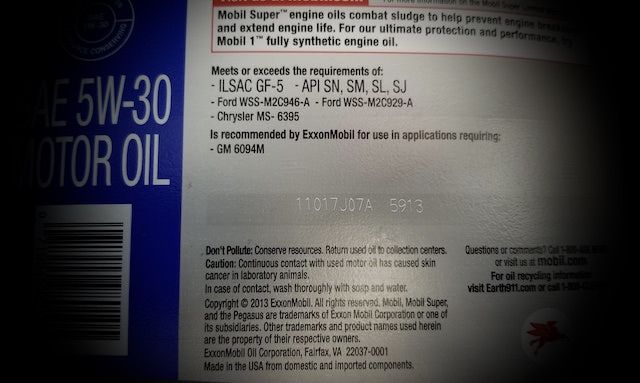Motor oil does expire due to its degraded ability to provide lubrication for vital engine components. Using expired motor oil is not advised.
When stored properly in the manufacturer’s unopened packaging, the shelf life of engine oil could be as high as five years. However, in general, the recommended shelf life for oils and greases is typically five years when stored properly in the original sealed containers.
Industrial and automotive oils may show deterioration by one or more of the following: cloudy appearance or strong odor. It is important to note that the shelf life of motor oil can vary depending on the type of oil and its storage conditions. In this blog, we will discuss the shelf life of motor oil in detail and answer some frequently asked questions related to motor oil expiration.

Credit: www.reddit.com
The Perplexity Of Motor Oil Expiration
Using old oil is not advised due to its degraded ability to provide lubrication for vital engine components.
Normal Shelf Life: In general, the recommended shelf life for oils and greases is typically five years when stored properly in the original sealed containers.
Industrial and automotive oils may show deterioration by one or more of the following: cloudy appearance or strong odor.
Currently, according to known oil specialists and lubrication laboratory testing a non-used or non-
Castrol oils have no expiration date.
Unfortunately, I’ve never seen a “use by” date on a bottle of oil, so how
Should I use open engine oil that was left over from
Synthetic oil has a shelf life of five years.
Shelf Life Of Motor Oil
Motor oil does not technically expire, but it can degrade over time. Unopened containers of motor oil can typically last up to five years if stored properly. However, once opened, the oil can start to deteriorate due to exposure to air and moisture. This can lead to changes in viscosity and lubricating properties, making the oil less effective at protecting the engine. It’s important to check for any unusual odors or changes in color or consistency before using opened motor oil. If any abnormalities are detected, it’s best to dispose of the oil properly and use a fresh supply to ensure optimal engine performance.
Storage Conditions And Oil Longevity
When it comes to storing motor oil, following ideal storage practices is essential to maintain its longevity. Proper storage conditions can help prevent the oil from expiring prematurely. It is important to store motor oil in a cool and dry place, away from direct sunlight and extreme temperatures. Exposure to heat, moisture, and sunlight can accelerate the oil’s degradation process.
Risks of improper storage include a decrease in oil viscosity, which can affect its lubrication properties. Additionally, exposure to air can lead to oxidation, causing the oil to become less effective over time. It is recommended to keep the oil in its original sealed container to prevent contamination.
Regularly inspecting the oil for any signs of deterioration, such as a cloudy appearance or a strong odor, is important. If any abnormalities are noticed, it is best to dispose of the oil properly and replace it with fresh oil.

Credit: www.gopurepower.com
Indicators Of Oil Gone Bad
Does Motor Oil Expire?
| Visual Clues |
| One way to determine if motor oil has expired is through visual clues. When inspecting the oil, look for a cloudy appearance or a strong odor. These can indicate that the oil has deteriorated and is no longer effective for lubricating the engine. Additionally, check the consistency of the oil. If it has become thick or sludgy, it may be a sign of expiration. |
| Odor and Consistency |
| The odor of expired motor oil can be unpleasant and may have a burnt or rancid smell. If you notice a foul odor, it is best to dispose of the oil. In terms of consistency, fresh motor oil should have a smooth and flowing texture. If it appears thick or clumpy, it may have expired. It is important to regularly check the quality of motor oil to ensure optimal engine performance and longevity. |
Synthetic Vs. Conventional Oil
When it comes to the shelf life of motor oil, synthetic and conventional oils have some differences. Synthetic oil is typically manufactured to last longer and has a longer shelf life than conventional oil. Synthetic oil can last up to 5-7 years, while conventional oil has a shelf life of around 2-5 years.
Synthetic Oil Shelf Life
Synthetic oil has a longer shelf life because it is made from high-quality, pure chemicals that are resistant to breaking down over time. However, it is important to note that the shelf life of synthetic oil can be affected by factors such as exposure to heat and moisture, as well as the quality of the oil.
Conventional Oil: Does It Last The Same?
Conventional oil has a shorter shelf life than synthetic oil because it is made from a blend of crude oil and additives. The additives in conventional oil can break down over time, leading to a shorter shelf life. It is important to follow the manufacturer’s recommendations for the storage and shelf life of conventional oil to ensure its effectiveness.
Expert Opinions And Industry Standards
Motor oil does have a shelf life, typically around 3 to 5 years when stored properly. While it doesn’t technically expire, it can degrade over time, leading to reduced effectiveness in lubricating engine components. It’s best to use fresh oil to ensure optimal engine performance.
| Manufacturers’ Guidelines | Insights from Oil Specialists |
| Unused engine oil can last up to 5 years when stored properly in unopened packaging, according to manufacturers. | While unused oil may last up to 5 years, oil specialists do not recommend using expired motor oil due to its degraded ability to provide proper lubrication to vital engine components. |
| Normal shelf life for oils and greases is typically 5 years when stored properly in sealed containers, according to industry standards. | Oils and greases may show deterioration after 5 years, such as a cloudy appearance or strong odor. |
| Castrol oils do not have an expiration date, according to Bob is the Oil Guy. | Lubrication laboratory testing confirms that non-used or non-opened motor oil does not have a specific expiration date, according to Blauparts. |
Usage Of Expired Oil: Potential Consequences
Using expired motor oil is not advised due to its degraded ability to provide lubrication for vital engine components. The risks of using expired oil include potential engine damage and performance impairment.
When motor oil expires, it can lose its effectiveness in protecting the engine from wear and friction. This can lead to increased engine temperature, excessive wear on engine parts, and potential breakdowns. The lack of proper lubrication can cause engine components to rub against each other, leading to increased friction and damage over time. This can result in costly repairs or even engine failure.
Expired oil may not be able to maintain the necessary viscosity and lubrication properties required for optimal engine performance. This can lead to reduced fuel efficiency, decreased power output, and overall poor engine performance. Additionally, the buildup of contaminants and impurities in expired oil can further contribute to engine inefficiency and decreased performance.
Proper Disposal Of Old Motor Oil
Environmental Considerations: When it comes to disposing of old motor oil, it is important to consider the environmental impact. Motor oil contains harmful chemicals and pollutants that can contaminate soil and water if not properly disposed of.
Recycling and Disposal Options: There are several options available for recycling and disposing of old motor oil. Many auto parts stores and service stations have collection programs where you can drop off your used oil for proper recycling. Additionally, some local waste management facilities may accept used motor oil. It is important to never dump motor oil down the drain, onto the ground, or in the trash, as this can have serious environmental consequences.
Proper Disposal Steps: To dispose of old motor oil, follow these steps:
- Drain the oil into a clean, leak-proof container.
- Take the container to a recycling center or collection program.
- Do not mix the oil with other substances or contaminants.
- Follow any specific guidelines or regulations set by your local authorities.
By properly disposing of old motor oil, you can help protect the environment and ensure that it is recycled or disposed of in a responsible manner.

Credit: www.reddit.com
Frequently Asked Questions
Can I Use 10 Year Old Engine Oil?
Using 10-year-old engine oil is not recommended due to its degraded lubrication ability.
Is It Ok To Use Expired Motor Oil?
Using expired motor oil is not recommended. It loses its ability to lubricate vital engine components properly. The shelf life of unused engine oil is typically five years when stored correctly in sealed containers. However, it is best to use fresh oil for optimal engine performance.
How Long Does Unused Engine Oil Last?
Unused engine oil can last up to 5 years when stored properly in a sealed container.
Does Oil Have A Shelf Life?
Yes, oil has a shelf life. Typically, the recommended shelf life for oils and greases is around five years when stored properly in the original sealed containers. Industrial and automotive oils may show deterioration by cloudiness or strong odor. It is not advised to use expired motor oil due to its degraded ability to provide lubrication for vital engine components.
Conclusion
It’s best not to use expired motor oil, as it may not provide adequate lubrication for your engine. Properly stored, unopened oil can last up to five years, but it’s always wise to check for any signs of deterioration before using it.
Regularly changing your motor oil is crucial for maintaining your engine’s performance and longevity.
